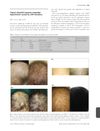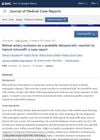 41 citations,
November 1993 in “Journal of The American Academy of Dermatology”
41 citations,
November 1993 in “Journal of The American Academy of Dermatology” DPCP helps treat severe hair loss, but 5% minoxidil doesn't add benefits.
 30 citations,
March 2011 in “Australasian Journal of Dermatology”
30 citations,
March 2011 in “Australasian Journal of Dermatology” Flutamide improves female hair loss when other treatments fail, but may cause liver toxicity.
 28 citations,
October 2017 in “Journal of Cosmetic and Laser Therapy”
28 citations,
October 2017 in “Journal of Cosmetic and Laser Therapy” Combining electrodynamic microneedle with 5% minoxidil improves hair growth and reduces hair loss in Chinese men.
 24 citations,
March 1987 in “Journal of The American Academy of Dermatology”
24 citations,
March 1987 in “Journal of The American Academy of Dermatology” Minoxidil 1% and 2% best promote hair growth and may prevent hair loss.
 19 citations,
May 2020 in “Journal of The American Academy of Dermatology”
19 citations,
May 2020 in “Journal of The American Academy of Dermatology” Low-dose oral minoxidil improves hair growth in male hair loss.
 14 citations,
January 2015 in “Skin appendage disorders”
14 citations,
January 2015 in “Skin appendage disorders” Minoxidil treatment for hair loss can cause scalp allergy and severe hair loss.
 13 citations,
September 2020 in “International Journal of Molecular Sciences”
13 citations,
September 2020 in “International Journal of Molecular Sciences” PRP therapy and minoxidil combo works best for male hair loss.
 13 citations,
May 2015 in “Journal of The American Academy of Dermatology”
13 citations,
May 2015 in “Journal of The American Academy of Dermatology” Oral minoxidil improves hair growth in men with hair loss, but caution needed for those with heart issues.
 13 citations,
July 2004 in “Skinmed”
13 citations,
July 2004 in “Skinmed” Common types of non-scarring hair loss have various causes and treatments, but more effective solutions are needed.
 12 citations,
September 2018 in “Dermatologic Therapy”
12 citations,
September 2018 in “Dermatologic Therapy” Daily low-dose aspirin lowers minoxidil's effectiveness for hair loss treatment.
 9 citations,
April 2018 in “JAMA Dermatology”
9 citations,
April 2018 in “JAMA Dermatology” Topical minoxidil improves hair loss in 80% of women with breast cancer undergoing endocrine therapy.
 9 citations,
January 2018 in “BioMed Research International”
9 citations,
January 2018 in “BioMed Research International” Tetrahydroxystilbene Glucoside may help prevent hair loss by blocking certain pathways that lead to cell death.
 8 citations,
January 2020 in “Journal of Cutaneous Medicine and Surgery”
8 citations,
January 2020 in “Journal of Cutaneous Medicine and Surgery” Oral minoxidil may improve hair loss in men and women, but has some side effects.
 7 citations,
March 2015 in “British Journal of Dermatology”
7 citations,
March 2015 in “British Journal of Dermatology” Applying minoxidil can help improve hair growth in people with hair loss caused by LIPH gene mutations.
6 citations,
November 2020 in “Chinese Medical Journal” Combining minoxidil and fibroblast growth factor is more effective for treating male hair loss than using either alone.
 5 citations,
April 2018 in “Journal of Cosmetic Dermatology”
5 citations,
April 2018 in “Journal of Cosmetic Dermatology” New 5% minoxidil formula safely and effectively treats male hair loss.
4 citations,
July 2018 in “International Journal of Research in Dermatology” Topical finasteride with minoxidil is effective for treating hair loss and may reduce the need for oral finasteride.
 4 citations,
December 2017 in “PubMed”
4 citations,
December 2017 in “PubMed” Minoxidil may help treat hair loss by reducing the activity of a specific enzyme linked to baldness.
 4 citations,
January 2017 in “Indian Dermatology Online Journal”
4 citations,
January 2017 in “Indian Dermatology Online Journal” A child used a hair growth lotion for hair loss, but it caused excessive hair growth on his face and neck instead.
 3 citations,
March 2022 in “Polymers”
3 citations,
March 2022 in “Polymers” Substances from Ascidian tunics might help treat hair loss as effectively as Minoxidil.
 3 citations,
October 1988 in “Clinics in Dermatology”
3 citations,
October 1988 in “Clinics in Dermatology” Using 3% topical minoxidil can help women with hair loss, but more research is needed.
2 citations,
January 2023 Nano-sized molybdenum may help treat hair loss and works well with minoxidil.
 2 citations,
November 1987 in “Archives of Dermatology”
2 citations,
November 1987 in “Archives of Dermatology” Minoxidil solution helps regrow hair in men with hair loss, with most improvement seen at 12 months and effects lasting over 30 months.
 1 citations,
July 2023 in “International Journal of Biological Macromolecules”
1 citations,
July 2023 in “International Journal of Biological Macromolecules” The study created a new hair loss treatment paste that regrows hair faster and with fewer side effects than minoxidil alone.
 1 citations,
October 2021 in “Journal of Medical Case Reports”
1 citations,
October 2021 in “Journal of Medical Case Reports” Using minoxidil for hair loss might cause sudden vision loss, so use it with caution and monitor closely.
 1 citations,
September 2020 in “Pediatric Dermatology”
1 citations,
September 2020 in “Pediatric Dermatology” Two teenage boys lost hair after taking a drug for growth, which was not a known side effect for kids.
 1 citations,
February 2019 in “PubMed”
1 citations,
February 2019 in “PubMed” Minoxidil is effective in treating various types of hair loss and can improve quality of life, with combination therapies showing increased effectiveness.
 October 2024 in “International Journal of Dermatology”
October 2024 in “International Journal of Dermatology” Oral and topical minoxidil are equally effective for hair loss, but oral minoxidil causes more unwanted hair growth.
 September 2024 in “Journal of the American Academy of Dermatology”
September 2024 in “Journal of the American Academy of Dermatology” Low-dose oral minoxidil helps hair regrowth in COVID-19-related hair loss with few side effects.
 August 2024 in “Archives of Dermatological Research”
August 2024 in “Archives of Dermatological Research” Combining botulinum toxin type A with Minoxidil significantly improves hair growth and patient satisfaction in male hair loss.



























